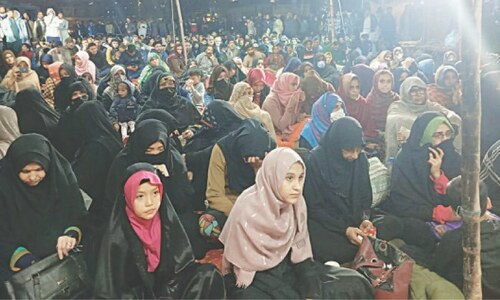KARACHI: Given that drastic climate change is inevitable, the only way to lessen its impact is to prepare ourselves and adapt to it in the best possible manner.
In this regard, a city-specific roadmap was discussed at a workshop, Climate change adaptation strategy for Karachi — a roadmap, at a hotel on Tuesday.
Organised by a non-governmental organisation, Shehri — Citizens for a Better Environment, the event identified and examined various factors that led to the present climatic conditions, and assessed the critical vulnerabilities that Karachi may be exposed to due to climate change.
Urban planner Farhan Anwar highlighted the need to involve the city government in order to realise an improvement in adapting to climate change.
Using visual aid, Anwar identified areas that are vulnerable to floods, droughts, sea-level rise and extreme heat events. He laid emphasis on the urgent need for a strategy to combat climate change in Karachi
He noted that a national disaster management report had discussed the impact of climate change on transport, energy and other sectors when it should have taken into account urban areas, which are important stakeholders.
Referring to the areas that are dotted with slums and hill settlements threatened by floods, Anwar said that there was a vital need to establish a ‘flood risk zone’ in order to rate the risk possibility.
“And to do that, we need a flood plan map, he added.
“Apart from Malir and Lyari rivers, we have bloated drainage and sewage systems,” he said, “In worst case scenario, in terms of flooding, storm water and rainfall, 50 per cent of the entire population in vulnerable areas will have to be evacuated. We need a surface management plan for Karachi, and should evaluate and improve the design and maintenance of drainage system.”
While discussing the critical challenges, Anwar noted that there was no effective policy or regulation in place to deal with disasters.
“The rural Karachi will be threatened by drought-like situation,” warned Anwar, drawing attention to the obvious effects of climate change, including a decrease in green spaces and cultivated farmland.
He also highlighted the economic impact of climate change in coastal areas, especially to the fisheries.
“We need a flood insurance cover and develop a ground water profile and policy,” he said, while stressing on a drought plan for Karachi along with a revision policies in various institutions.
Earlier, Roland de Souza of Shehri took his audience through a series of visual slides and highlighted the cost the world was paying for its luxuries. He called the entire issue a ‘cancer’ and advised the audience to make others aware of this ‘disease’.
“In 2010, the country affected most was Pakistan, and there will be a repeat of this,” he warned, zeroing in on elite consumerism and increased dependence on private vehicles as major causes of greenhouse emission.
Dr Noman Ahmed, professor and chairman of architecture and planning department at the NED University, discussed the role of stakeholders and other various entities in combating climate change. Replying to a query, Dr Ahmed underlined the importance of public participation regarding climate change.
“We need to demonstrate the negative impact of climate change in our day-to-day lives, and this will rapidly bring awareness among the public,” he said.
General Secretary of Shehri Amber Alibhai noted that at present our institutions cannot deal with the task of mitigating dramatic climate changes.
Highlighting the water problem, she cited the example of Gadap where people had given up crop cultivation due to water scarcity. Another reason, she said, was gravel excavation that had a serious impact on the city.
“Reti bajri comes from riverbeds that we need for our sustainability,” she said, adding that this is a serious impact of real estate that should be addressed.
A short documentary on the hazards of climate change, put together by students of the NED University, was also screened at the workshop.














































